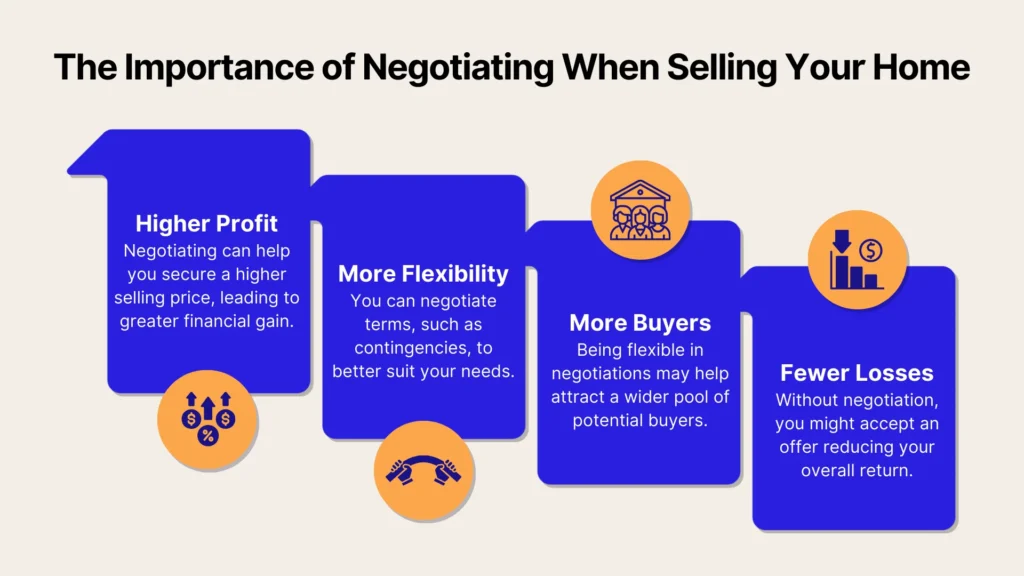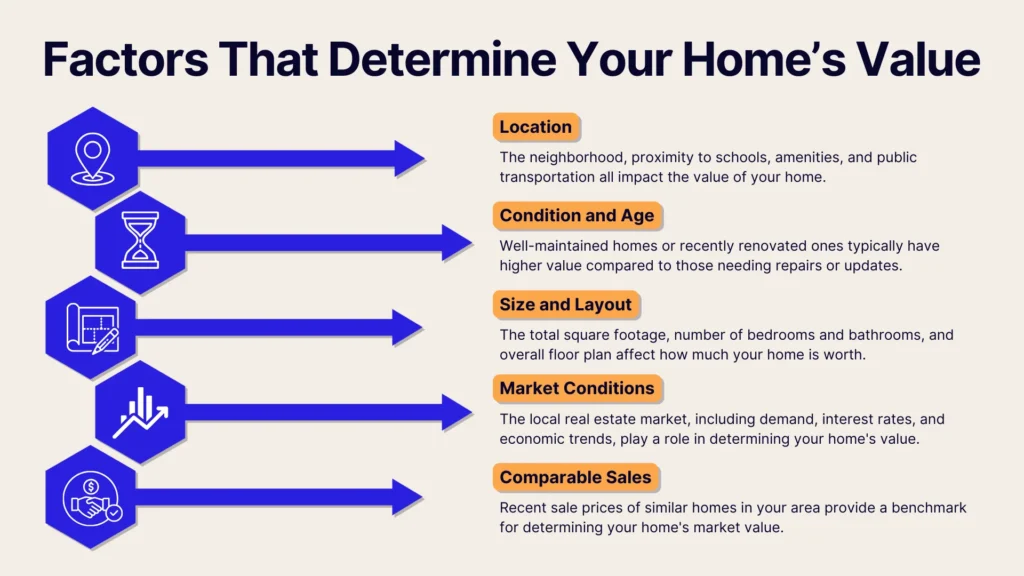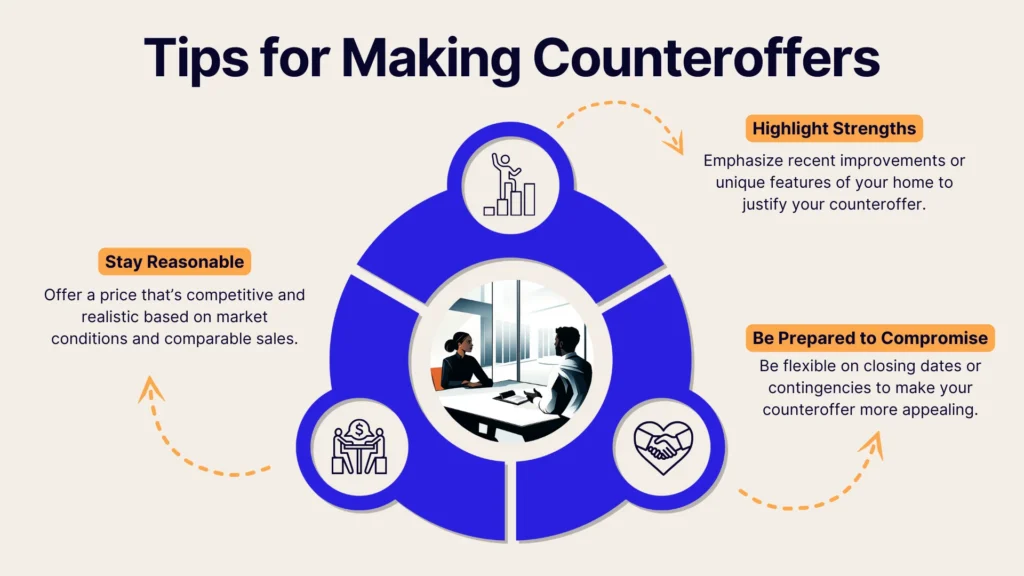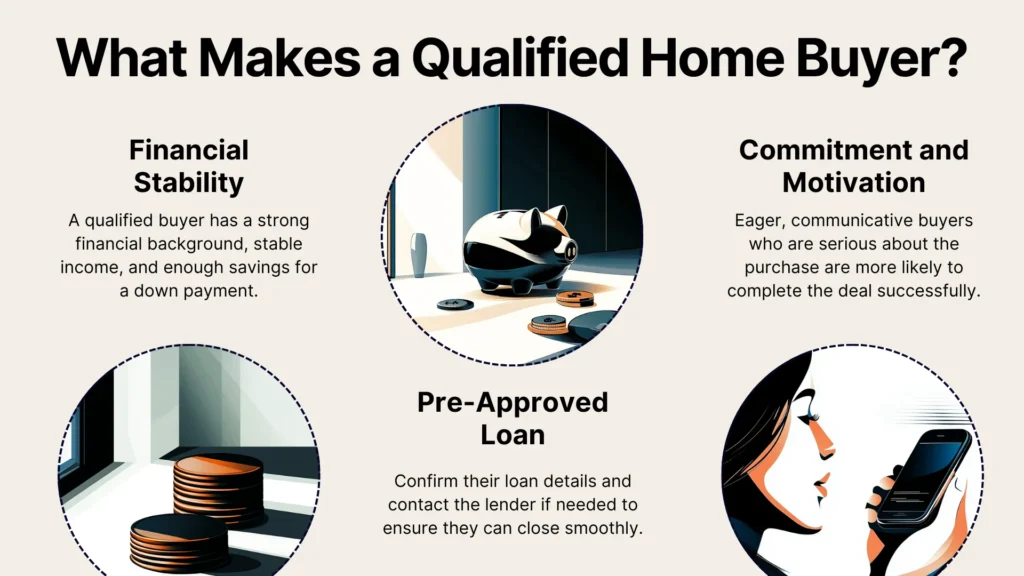Selling your home on your own, known as For Sale By Owner (FSBO), gives you full control over pricing and marketing. However, negotiating the deal can be challenging. From discussing price and contingencies to finalizing closing terms, having a solid plan is crucial to staying on track.
Negotiation isn’t just about securing the highest offer, though; it’s about finding the right balance between your goals and the buyer’s needs. Being well-informed and flexible can help both sides reach a fair agreement. Even if you're confident in your home's value, effective negotiation is key to getting the best deal without an agent.
Let’s take a closer look at why negotiation matters for FSBO sellers and how you can prepare for success.
Importance Of Negotiation For FSBO Sellers
According to the National Association of Realtors (NAR), FSBO sellers often spend over 20 extra hours on negotiations, but they secure roughly 90% of the sale price while avoiding up to a 6% commission fee.
Negotiation involves more than just settling on the final price—it also covers critical aspects like inspections, timelines, and fees. Managing these elements effectively can lead to a smoother closing process with fewer surprises along the way.
By understanding what’s at stake and preparing ahead, you can navigate negotiations with confidence and achieve a successful sale on your terms.

Preparing For Negotiation
Being well-prepared is half the battle. You’ll want to enter negotiations with a clear idea of your home’s true worth, your financial limits, and how to present your property in the best possible light. It’s all about planning – and that starts right now.
Understand Your Home’s Value
The right price matters—set it too high, and buyers might not bite; too low, and you might end up with less than you deserve.
One way to properly value your home is by doing a Comparative Market Analysis (CMA), which gives you a snapshot of your home’s value by comparing recent sales, but pricing is more than just numbers. A professional appraisal is another option that goes deeper, considering key details that influence your home’s worth.
AI-driven tools like PropBox can also help with a proper valuation. With Propbox, you’ll get detailed market reports through the market trends analysis and an accurate price estimate with the AI valuation tool, offering three pricing strategies – quick sale, market value, or aggressive pricing. Plus, the appraisal coordination feature takes care of scheduling and valuation reviews, making the process effortless.

Know Your Bottom Line
Knowing your bottom line is key to smooth negotiations. Begin by calculating all the expenses linked to selling your home, including closing costs, any remaining mortgage balance, and potential repair bills, then add your desired profit margin. This helps you determine the minimum acceptable price that aligns with your financial goals.
Instead of sticking to a single figure, you may want to consider setting a price range to give yourself some flexibility during negotiations. Having a well-defined range means you can confidently respond to buyer requests without constantly worrying about over-compromising your bottom line.
Prepare Your Home For Showing
A well-presented home naturally attracts serious buyers, putting you in a stronger position during negotiations. Addressing small issues like leaky faucets, chipped paint, or squeaky doors, along with some simple touch-ups and thoughtful staging, can give buyers confidence in your property. Even small details like fresh flowers or a pleasant candle scent can transform your space into a welcoming home.
High-quality photos are a game changer for showcasing your home's best features, creating a picture-perfect listing that captures attention and brings in more potential buyers. This visual appeal, whether it highlights a cozy fireplace or a spacious backyard, can significantly boost your negotiating strength.
Receiving and Reviewing An Offer
Now that you’ve laid the groundwork, it’s time to review incoming proposals. This stage can be thrilling – someone wants to buy your home! However, it’s essential to evaluate each bid thoroughly. One offer might feature a high price but come with complicated contingencies, while another might be straightforward but slightly lower.
When buyers make an offer, it comes with a purchase agreement outlining key details like price, closing date, and conditions. Reviewing everything thoroughly is key to avoiding surprises later, as industry data shows that nearly 30% of home sales face delays due to issues like financing or inspection contingencies, according to real estate professionals.
Contingency clauses are another important factor to consider. While it's normal to see a few contingencies, too many can make a deal feel uncertain, and real estate reports indicate that about 20% of transactions fall through because of them. Giving the offer a thorough look can help you steer clear of potential hiccups and keep the closing process running smoothly.
Consider All Offer Aspects
Beyond the dollar amount, there are other things that affect whether an offer is genuinely favorable.
- Price: Naturally, the offer amount is a big deal. A modestly lower price combined with fewer contingencies may be more attractive over time.
- Closing Date: The buyer’s preferred closing timeline needs to mesh with your plans. If you’re in a rush to sell, an offer with a quick closing date could be ideal – even if it’s not the absolute highest bid.
- Contingencies and Other Requests: Buyer requests for repairs or appliance replacements can be part of the package. Weigh the cost and time involved against the overall offer.
Tips for Effective Counteroffers
If you’re not fully satisfied with an offer, don’t worry – it’s common to counter. A thoughtful counterproposal can bring you and the buyer closer to a fair deal without alienating anyone.
Securing a better deal requires solid facts that support your position. Buyers are more likely to respond positively when presented with data-driven insights, such as recent sales, professional appraisals, and the value of key upgrades—whether it’s a renovated kitchen or energy-efficient appliances.
With PropBox’s seamless electronic counteroffer submissions and automated document preparation, you can stay organized and on track every step of the way—ensuring a smooth and stress-free negotiation process.

Keep Emotions In Check
Selling your home can be personal, and unfortunately, memories and hard work can cloud your judgment when you receive an offer that feels too low. Remind yourself that this is a business transaction. Look at how an offer measures up to your bottom line and the property’s market value.
Even if the buyer’s initial bid is disappointing, politeness can go a long way toward eventually reaching a good compromise. Avoid venting or expressing frustration. Instead, respond thoughtfully, keeping your end goal in mind.
Accepting An Offer
Once you find an offer (or a counteroffer that you can happily live with), it’s time to say yes. Still, don’t jump into acceptance without confirming all those tiny details that can save you headaches later.
Check If It Meets Your Bottom Line
It’s important to stay mindful of your calculated expenses and profit margins when reviewing an offer. Accepting a price that doesn’t align with your financial goals could lead to regrets later. Before finalizing any deal, carefully review the numbers to confirm they align with your bottom line.
Be sure to account for final costs such as taxes, repair credits, and other fees that can eat into your net profit. If you've made concessions during negotiations, revisit your calculations to confirm the final offer still meets your expectations. Keeping these factors in check helps you achieve the financial outcome you planned for.
Confirm That The Buyer Is Qualified
An eager buyer is always a good sign, but their ability to follow through is what truly matters. Lenders require proof of financial stability, and it's important to be aware of any potential red flags. Major credit issues or an inconsistent employment history could put the entire deal at risk if their financing falls through at the last minute.
Don't hesitate to ask questions about the buyer's loan approval process. Understanding how their lender operates and even requesting direct contact with the mortgage professional can provide valuable insights. This extra step can help you feel more confident that the buyer is financially prepared to close the deal without unexpected setbacks.

Pre-Approval And Earnest Money
A strong display of commitment from the buyer can provide reassurance that they’re serious about the purchase. One way to gauge this is through pre-approval documents, which show that a lender has already reviewed their finances and is prepared to provide financing up to a certain amount.
Another sign of commitment is an earnest money deposit, which buyers submit to show they’re serious about the transaction. If the buyer backs out for reasons not covered by contingencies, you may have the right to retain the deposit. This protects you and keeps the buyer committed.
Closing The Deal
After everyone agrees on the terms, it’s time to wrap up the final details and head toward the closing table. This last stretch might feel like a race, but a prepared seller can handle it with minimal stress.
Finalize The Paperwork
Legal documents and official forms are a big part of any property sale. This is where attention to detail comes into play. Before finalizing the deal, take the time to review the entire purchase agreement to confirm that all negotiated terms, such as repair credits or specific deadlines, are clearly included.
In some states, having a real estate attorney review the contract is recommended or even required. While it may be an extra expense, the added peace of mind can make all the difference in avoiding potential issues down the line.
Prepare For Closing Costs
Closing costs can encompass a range of fees that may catch you off guard if not planned for in advance. Expenses like escrow services help keep funds securely held until the sale is finalized, while title fees verify the property is free of any liens.
Depending on your location, additional costs such as transfer taxes, title insurance, or even home warranty policies can quickly add up. Being aware of these potential charges and factoring them into your budget helps you avoid surprises and ensures a smoother closing process.
Conclusion
Understanding your home’s value, setting clear expectations, and negotiating confidently are key to a successful sale. Staying patient and informed with market data will help you navigate the negotiation process smoothly, and with PropBox, you don’t have to tackle it alone.
Our AI-powered tools help you take control of negotiations and craft strong counteroffers so you can make confident decisions without second-guessing. Whether it’s getting an accurate home value estimate, managing documents seamlessly, or staying on track with important deadlines, PropBox keeps things organized and stress-free.
Ready to simplify your home-selling journey? Get started with PropBox today and see how easy it can be to sell on your terms.
